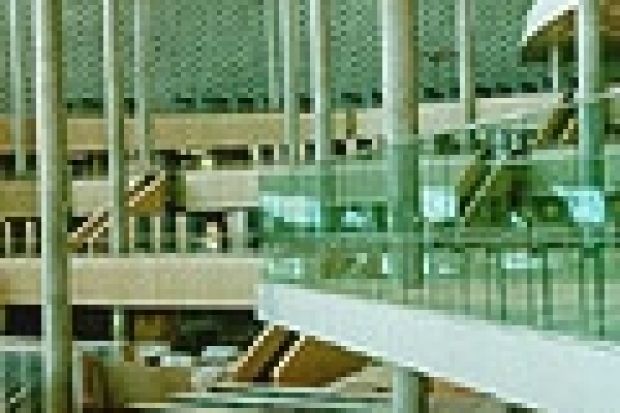Alexandria's lighthouse, once one of the seven wonders of the world, has long since gone. So too has the library that acted as a magnet for the great minds of classical antiquity. Today, work is almost complete on a 21st-century version.
A modern research centre open to the public, but largely catering for academics, will specialise in Pharonic Egypt, Graeco-Roman culture, ancient Christianity and medieval Arab culture. The site, if Dinocrates' city plan of Alexandria of 332BC is accurate, is the exact location of the original museum and library. The project has cost $0 million (£190 million).
Mohamed Abbadi, professor of classics at the University of Alexandria, said the library would enable more students to continue their studies at home rather than having to travel abroad. He said: "When I took a year's sabbatical as a postgraduate to go back to my old college at Cambridge, I hardly had enough time to enjoy all the facilities. This new research centre will allow our scholars breathing space."
The quantity of information and literary works held by the ancient library would have been breathtaking, and, according to Professor Abbadi, "opened up the possibility that knowledge could be universal".
Ahmed Abdel Fattah, director of the Graeco-Roman Museum in Alexandria, resists the suggestion that the new library's contents will be censored despite the banning of books on religious grounds in modern Egypt. He expects the library will rediscover the tolerance that existed when the ancient library was being built up. "Man was more free under pagan rulers like the Ptolemies. They accepted books from any source on any subject."
Professor Abbadi said Muslims had an undeserved reputation for burning books and libraries arising from an incident during the Crusades in the 12th century. "Salladin was desperate for money and the Crusaders were keen to get their hands on books, particularly those translated from the ancient Greeks. Contemporary sources tell us that he sold them a library of books. This has been interpreted to mean that Islam destroyed books."
Fact file
Founded by Alexander the great, the Library of Alexandria built c . 295BC by Athenian exile Demetrius of Phaleron under the patronage of King Ptolemy I. In 48BC 10 per cent of the holdings were burnt when Julius Caesar attacked Alexandria. Expansion continued until AD3, when Roman emperors Aurelian, and later, Diocletian sacked Alexandria. Then in AD391, emperor Theodosius completed the destruction.
The ancient library housed some 490,000 scrolls and attracted scholars such as Euclid, Eratosthenes, Aristophanes and Archimedes.
Egyptian President Mubarak laid the cornerstone of the new library in 1986. It will have:
- 13 floors
- 3,500 seats
- 4-8million volumes
- 50,000 maps
- 100,000 manuscripts
- 250,000 disks/tapes/videos
Leading donors:
- Japan - $500,000 (audiovisual equipment)
- Norway - $4m (furniture)
- France - 11m (feasibility study, staff training, books
- Italy - $400,000 (science museum equipment, conservation laboratory, automation training
Books received from Australia, Canada, China, Greece, Germany, Italy, Mexico, Oman, Saudi Arabia and the United Arab Emirates.
Register to continue
Why register?
- Registration is free and only takes a moment
- Once registered, you can read 3 articles a month
- Sign up for our newsletter
Subscribe
Or subscribe for unlimited access to:
- Unlimited access to news, views, insights & reviews
- Digital editions
- Digital access to THE’s university and college rankings analysis
Already registered or a current subscriber? Login
